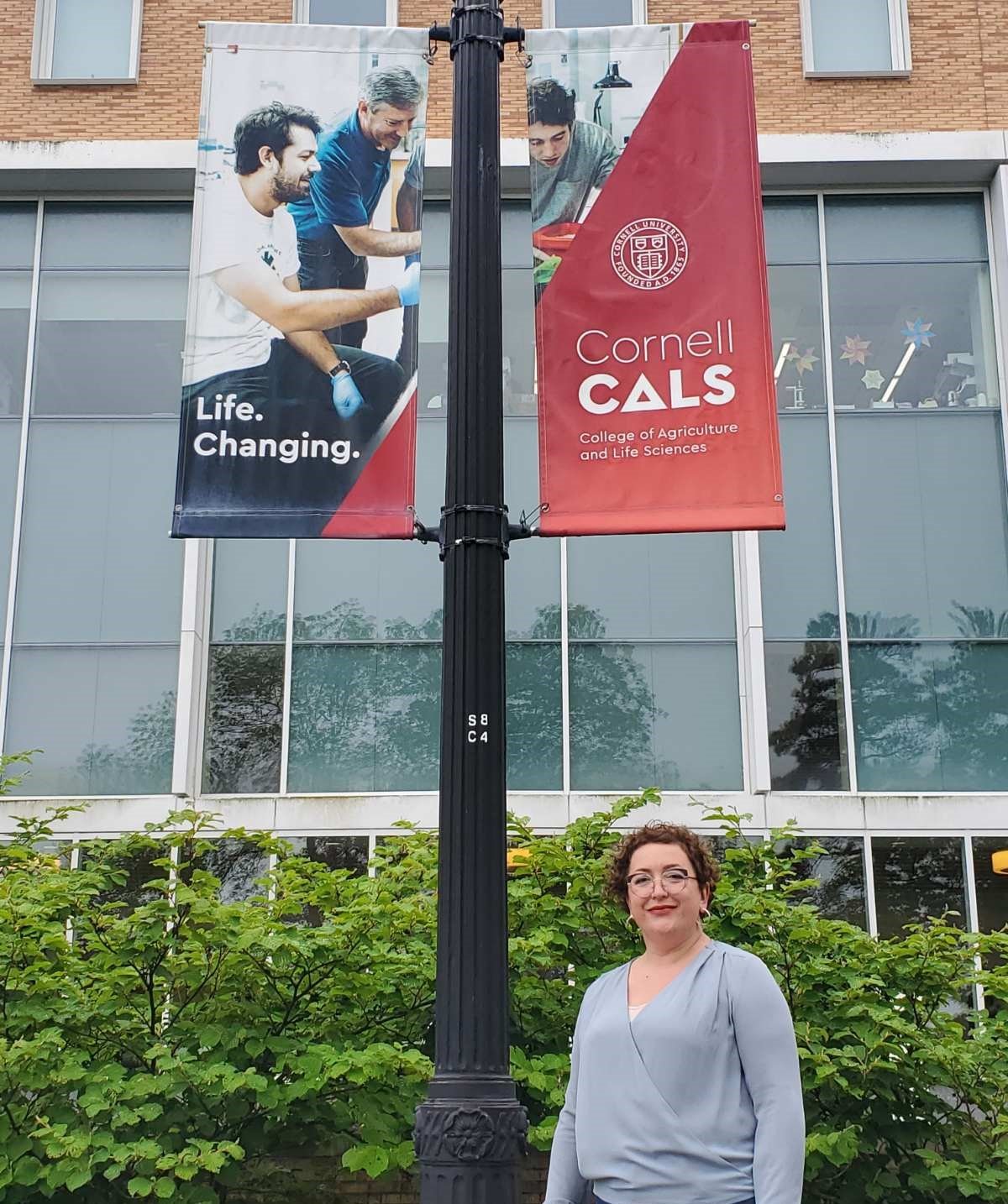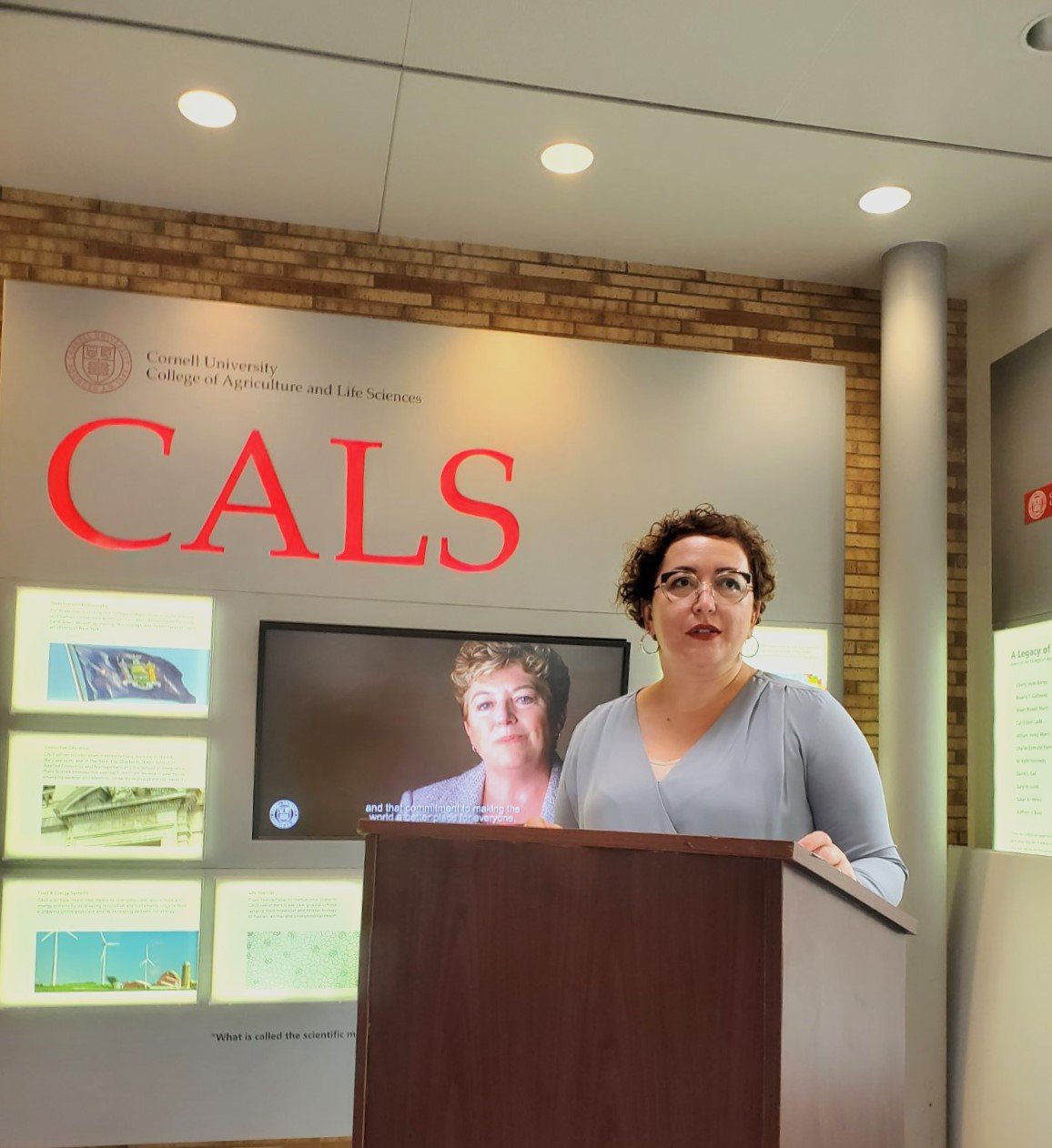Fulbright Visting Scholar Program Spotlight: Dr. Arbenita Hasani


Applying for a program such as Fulbright can be a nerve-wracking experience. In order to ease your mind and provide you with an insider’s look into the Fulbright experience, we decided to catch up with our alumni and on-program scholars. We asked them to reflect on their experience and answer our insightful questions.
We are continuing our series of questions with our Fulbright Visiting Scholar 2021-2022 grantee, Dr. Arbenita Hasani who was a Fulbright Visiting Assistant Professor/Researcher at Cornell University, Ithaca, New York.
The Fulbright Visting Program makes it possible for roughly 850 faculty and professionals from around the world every year to receive Fulbright Scholar grants to conduct advanced research and university lecturing in the United States.
Individual grants are available to scholars from over 100 countries. Individuals who meet the eligibility requirements apply for grants through USKEB. After a thorough selection process in the home country, final approval for awards is issued by the presidentially appointed Fulbright Foreign Scholarship Board (FSB) in the United States. Exchanges range in length from three to twelve months.
The Fulbright Visiting Scholar Program competition for the 2023-2024 academic year is now open and will be available until November 1, 2022.
To learn more visit: U.S. Embassy Prishtina.
This is a joint program of the U.S. Department of State and the Government of Kosovo.
1. What is your educational and professional background?
My educational and professional background are in the Food Science field. I have a BSc Degree in Food Technology, MSc in Food Engineering, and a Doctorate degree in Food Science and Biotechnology. Since 2014 I am employed by the University of Prishtina “Hasan Prishtina,” Faculty of Agriculture and Veterinary, Department of Food Technology with Biotechnology. Currently, I hold the Assistant Professor position and am head of the MSc program in Food Science. Thanks to Fulbright, I was appointed as Visiting Assistant Professor/Researcher at Cornell University, Ithaca, New York.
2. Why did you choose to apply for Fulbright Program?
I believe that as social beings, we all have that inner need for constant growth and development, which can be best-achieved ones we challenge ourselves to get out of our comfort zone, that in this case, served as propulsion to apply for me. Furthermore, the Fulbright Visiting Program, a grantee of which I am, enables you to take dependents (spouse and/or children) with you during the time of your study/research visit. This was well thought out, enabling one to achieve professional and personal growth goals without choosing between parenthood and further career development.
3. Tell us about your experience as a Fulbrighter in the U.S.?
After acceptance by Prof. Terry E. Acree to be part of his team for this academic year and thanks to Fulbright’s grant, I was given the opportunity to be Visiting Assistant Professor/Researcher at one of the Ivy League’s and best-ranked universities in the world (for centuries ranked in top 15 universities of the world) such as Cornell University. During this time, I was exposed to a great mentor, ideal role model, brilliant mind, and the most beautiful soul I have ever met, my faculty, Associate Professor Terry Acree. I was blessed with his support, cooperation, and inclusiveness. My Fulbright experience at Prof. Terry’s Research Lab at Cornell’s Food Science Department has been enormously successful, we designed a research project, and its data was presented at the Annual Meeting of the Association of Chemosensory Scientists. Soon we will have a joint scientific publication. I also worked with students to improve our subject screening, protocols, and experimental design.
4. What is the most valuable component you are gaining from the program?
It is not easy to say which is the most valuable component I am gaining from the program, since sincerely, there are multiple benefits that I am gaining from it. First is professional development. Coming from a developing country, from institutions with lots of financial and infrastructural limitations to Cornell University and being exposed to the most modern teaching and research techniques and infrastructure was like traveling to the future. I had previously had some opportunities to visit some of the universities in European developed countries, but Cornell makes a huge difference. I was so lucky to have an extraordinary faculty associate who became my role model to follow.
During my stay, I have made many new friends and colleagues from different parts of the world. This has been an excellent opportunity to experience novel ideas, students, and professors that come to Cornell University. I also had the opportunity to meet with other Fulbrighters from all over the world, staying in NYC thanks to the Fulbright-founded organization “One to world” which organized many social activities that brought us together.
Last but not least, the program impacted my family for two generations since I stayed in Ithaca with my 11 years old daughter who finished her 5th grade of the elementary school in Ithaca, NY, with an award as an extraordinary student by the Ithaca School District. Besides the challenges of longing for her beloved ones back home in Kosovo, she was exposed at an early age to a multicultural environment. She excelled in her language skills and met with incredible teachers and lovely friends that made her feel at home away from home.
It is with my deepest gratitude that I thank the Fulbright Foundation for this opportunity.
4. How do you plan to implement the knowledge gained as a part of the program at your home institution?
At Prof. Terry’s Aroma Research Lab at Cornell’s Food Science Department, we mainly worked with Gas Chromatography Olfactometry (GCO) and recently invented and developed a tool by prof Acree, the Sniff Olfactometer (SO), to study the perception of odorants in mixtures. Using Psychophysical experiments involving the SO and key odorants from foods, we studied the temporal effects of odorant mixtures on odor image formation and relating response to the hedonic state.
Prior to returning to Kosovo, we agreed with prof. Acree and other colleagues at Cornell University to strengthen our personal and interinstitutional collaborations. I am working on preparing a project to apply for donor organizations to enable the provision of the University of Prishtina with GCO and SO that would enable to pioneer similar research and studies also in my home institution.
5. How was the application process for you and what tips do you have for prospective candidates?
The application process was easy but not short; to be honest, it takes dedication. The application deadline was in November 2020, and the final answer that my application was selected I received in July 2021. I believe this is because of the many steps and parties involved in the selection process for transparency and meritocracy, which is genuinely appreciated!
The tip I would like to share with prospective candidates is to give the proper time to the process. A prerequisite to applying for Fulbright Visiting Program is acceptance or invitation from a US higher education institution, a process that requires time and effort before applying for the program.
It is definitively so worth of it every effort, so do not hesitate, go for it!
6. What is the biggest culture shock you are experiencing in the U.S?
I didn’t experience any culture shock at all! The cultural adjustment was so smooth and natural for both of us, my daughter and me. I can say that I was not shocked but positively impressed by the acceptance in American society, a society founded on the belief in values and inclusiveness that is hardly found in Europe and especially in Balkan countries. One of the recent questions my daughter raised was why Europe is not as united as the United States? I hope her generation will open to appreciate the strength and beauty of everyone and feel a citizens of the world!
7. What is your favorite place you have visited while participating in the Fulbright program?
During my stay, I had the opportunity to visit besides Ithaca, where I was based, New York City, New Jersey, Washington DC, Texas, and Florida. Every one of those places was unique, offering different joy and perspectives. Ithaca is a city and university town located in the Finger Lakes region of New York. It is the place of the most beautiful nature I have ever seen. With lots of breathtaking natural monuments such as lakes, rivers, and waterfalls. New York City has its own beauty, the city that never sleeps. Washington DC, the US capital, I found to be quiet and beautiful with imposing neoclassical, magnificent monuments and buildings. Orlando, Florida, the paradise on earth, the place of beautiful beaches, Universals, and Disney land attractions, as well as Kennedy Space Center, will be in our memories forever.
8. What is your favorite American dish/food?
Hmmm, I am in between slow-cooked turkey and pecan pie.
